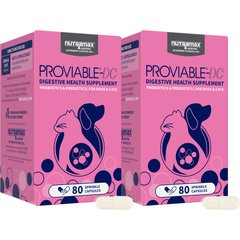Worried About Allergies in Your Kids? Get a Pet
When I was in college, I worked summers at a pediatrician’s office answering phones. I sustained a lot of verbal abuse from stressed out parents in those months; the type of experience that forever made me appreciate my own front desk staff down the line. None of that bothered me, however, nearly as much as it did when people callously tossed off reasons they no longer had a dog or cat.
People have lots of terrible excuses for getting rid of the family pet when they are expecting a child: “I don’t have time any more,” or “I’m worried about Toxoplasmosis,” or, “I can’t afford a dog AND a child.”
Ask any shelter employee in the relinquishment department and they will have their own frustrating contributions to add. But as of this week, people looking to shirk their responsibilities may be down one excuse: the fear that pets increase the likelihood of allergies.
Recommended Pet Products
- Nutramax Proviable Probiotics & Prebiotics Digestive Health Supplement for Dogs & Cats, 160 count$89.98Chewy Price
- Fera Pets USDA Organic Pumpkin Plus Fiber Support for Dogs & Cats, 90 servings$34.95Chewy Price
- All Four Paws Comfy Cone E-Collar for Dogs & Cats, Black, Small$20.24Chewy Price
- Virbac Epi-Otic Advanced Ear Cleaner for Dogs & Cats, 4-fl oz bottle$13.19Chewy Price
According to an article published September 3 in Journal of Allergy and Clinical Immunology, infants who shared a household with a furry pet also shared their gut bacteria, a species-specific form of beneficial bacteria from the Bifidobacteria family. When those infants and a control group of infants without pets were tested for allergies at six months of age, none of the babies who tested positive for common allergens such as cow’s milk, grass, banana, and dog dander had those bacteria in their system.
It’s not the first time research has linked more allergens with fewer allergies. Previous studies also suggest that children exposed to dog dander have less reactivity to airborne allergens, which probably means my kids have lungs of steel by this point. While scientists have tried to pinpoint the exact mechanism behind this, “germ theory” suggests that early exposure to bacteria confers a protective effect on the immune system. This study builds on that by correlating pet ownership with both beneficial gut bacteria and a positive health outcome, at least at six months of age.
We have a ways to go before doctors prescribe dogs as a preventive measure to pregnant women with a history of allergies, but we’re also moving away from those same women being encouraged to relinquish those pets. Regardless of the overall effect, the study authors are confident that avoiding pets does not prevent the onset of allergic disease.
I don’t mean to imply that there are no cases in which someone must make the agonizing decision to rehome a pet due to severe allergic disease; it can and does happen, and people should still trust the advice of their medical professionals. On the other hand, for the rest of us out there who wonder if a pet is an automatic allergy sentence, there’s hope: dogs and cats.

Dr. Jessica Vogelsang
Image: Thinkstock
Related




